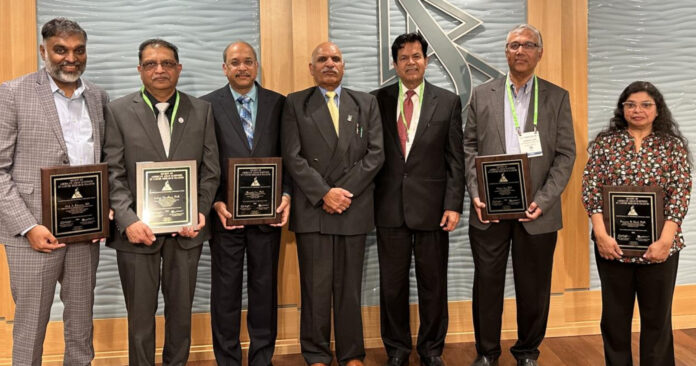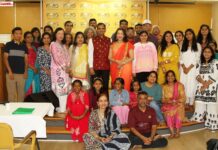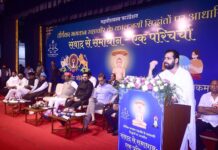Nine American Asian scientists awarded for novel discoveries in cancer research by SAASCR at American Association for Cancer Research Annual Meeting 2024
India Post News Service
The Society of American Asian Scientists in Cancer Research is a non-profit, non-political organization registered in the state of California in 2004 and has more than 5,000 members. All our members are also members of American Association for Cancer Research (AACR). SAASCR scientists are from Asia, mainly of Indian origin, working in the USA and Canada in the field of cancer research and fully sponsored by the biotechnology companies.
Dr. Rajvir Dahiya, the president of SAASCR, presented awards to these scientists on April 7th 2024 in San Diego, California during American Association for Cancer Research Annual Meeting. Dr. Rajvir Dahiya is a Professor Emeritus at the University of California San Francisco (UCSF) School of Medicine. Dr. Dharam Pal Chauhan is a secretary of SAASCR and is a retired Professor from University of California San Diego (UCSD) School of Medicine.
Alok A. Khorana, M.D., is a Professor of Medicine, Cleveland Clinic Lerner College of Medicine, the Sondra and Stephen Hardis Endowed Chair in Oncology Research, Vice-Chair for Academic Development of the Taussig Cancer Institute (part of Case Comprehensive Cancer Center) and Director of the Gastrointestinal Malignancies Program at the Cleveland Clinic, Cleveland, Ohio. His clinical and translational research program focuses on predictive factors and drug development in cancer-associated thrombosis and gastrointestinal cancers and has been funded by grants from the NIH, CDC, “Stand Up To Cancer” (Colorectal Cancer “Dream Team”) and others. His work led to development of the first risk assessment tool to identify patients at risk for cancer associated thrombosis – now known as the “Khorana score” – and development of novel agents for primary prevention and treatment of VTE. His recent work has focused on young-onset gastrointestinal cancers with novel findings describing risk factors, “hot spots” and microbiomic and metabolomic profiles.
Dr. Khorana received his medical degree from Maharaja Sayajirao University’s Medical College in Baroda (now Vadodara, Gujarat), India. His postdoctoral training included a residency in internal medicine at the University at Buffalo in New York and a fellowship in hematology/oncology at the University of Rochester, New York. He is a Fellow of the American College of Physicians and in 2018 was elected Fellow of the American Society of Clinical Oncology. He is currently Chair of the Medical and Scientific Advisory Board of the National Blood Clot Alliance. Dr. Alok Khorana is a nephew of Nobel Laureate (1968) Dr. Har Gobind Khorana.
Jaideep Chaudhary, Ph.D. is a Professor and Dean, School of Arts and Sciences and Interim Director of the Center for Cancer Research and Therapeutics Development at Clark Atlanta University, Atlanta GA. Prior to becoming Dean, Dr. Chaudhary served the school as the Associate Dean. He is an internationally renowned cancer biologist with more than 60 peer reviewed publications and book chapters. He also has 3 patents to his credit. His research focuses on understanding the molecular basis of prostate cancer and health disparities. He obtained his research funding from National Institutes of health (NIH), Department of Defense (DoD), National Science Foundation (NSF) and American Cancer Society (ACS). Dr. Chaudhary earned his Bachelor’s and Master’s in Biophysics from Panjab University, Chandigarh, India, and PhD from Agra University (National Institute of Health and Family Welfare, New Delhi), India specializing in reproductive endocrinology. Dr. Chaudhary’s research has also allowed him to mentor more than 17 graduate students in research and guide them in the successful completion of their Ph.D. degrees. As a Dean, he has played a significant role in developing new programs, student success and promoting faculty who subsequently launched a successful academic career.
Prior to joining Clark Atlanta University, Dr. Chaudhary served as assistant director for the Center for Reproductive Biology at Washington State University, Pullman, WA. In addition to his academic career, Dr. Chaudhary has also worked as Group leader and Principal Scientist in the Biotechnology industry developing diagnostics and early-stage therapeutics for ovarian cancer. As a thought leader and higher education administrator, he is involved in developing a qualified and diverse faculty, strengthening interdisciplinary collaborations, building new academic programs, and fostering a positive culture. He has been instrumental in securing financial and academic resources for undergraduate and graduate students and faculty professional development.
Maneesh Jain, Ph.D. is a Professor of Biochemistry and Molecular Biology at the University of Nebraska Medical Center, Omaha. He received his Ph.D. from Institute of Microbial Technology, Chandigarh, India and did his post-doctoral training at UNMC. Dr. Jain’s translational research program is aimed at improving early detection and treatment of pancreatic cancer, which is one of the most lethal malignances. A major focus of his research is to improve the delivery and distribution of therapeutic agents for pancreatic cancer.
Jain’s team is studying the role of signaling pathways involved in the complex cellular crosstalk in the tumor microenvironment with a goal to selectively modulate the obstructive effects of stroma. His initial research demonstrated the utility of cell-penetrating peptides from improving the uptake and distribution of radiolabeled single-chain antibody fragments in tumors. Subsequently, his laboratory investigated the utility of endothelin-axis antagonists as selective modulators of tumor microenvironment to improve delivery of chemotherapeutic drugs. These efforts led to an ongoing collaborative NIH-supported clinical trial in pancreatic cancer patients. His laboratory is also engaged in evaluating biomarkers for early diagnosis, and developing targeted therapeutic approaches (radioimmunotherapy, antibody therapy, and immunotherapy) that exploit differential overexpression of mucins in pancreatic cancer. His laboratory has developed monoclonal antibodies against several mucins that are useful for developing diagnostic and therapeutic modalities for pancreatic and other cancers. These antibodies are being used to develop assays and kits to study mucin expression in tissue and biological fluids and develop targeted therapeutics. Jain lab is also engaged in developing immunotherapy for pancreatic cancer. Along these lines, Dr. Jain is leading collaborative effort to develop mucin-based nanoparticle vaccine for pancreatic cancer that is currently being evaluated in preclinical models. Dr. Jain has authored more than 125 peer-reviewed publications in leading journals
Subrata Sen, Ph.D. is a Professor and Deputy Chair in the department of Translational Molecular Pathology at the University of Texas MD Anderson Cancer Center in Houston. He is also a member of the faculty at the University of Texas Graduate School of Biomedical Sciences at Houston where he served as the Director of the Program in Human and Molecular Genetics during 2012-2014. Dr. Sen received his PhD degree in 1980 from the Institute of Science of Banaras Hindu University (BHU) in Varanasi, India and served as a Lecturer in the Department of Zoology in BHU between 1980-1982 before moving to USA to do post-doctoral fellowship in the Department of Cell Biology at the University of Texas MD Anderson Cancer Center in Houston supported by a Fulbright Travel Award. Dr. Sen was a Visiting Fellow in the Department of Genetics at the University of Illinois College of Medicine in Chicago during 1991. Through the course of his academic career, Dr. Sen has been teaching and mentoring graduate students and clinical fellows besides pursuing an active research program in the field of cancer with focus on identifying genetic alterations driving initiation and progression of cancer. These studies have led to the development of novel targets for cancer therapy and markers for surveillance and detection of cancer.
Dr. Sen developed an innovative technique of cloning genes from specific regions of human chromosomes micro dissected from metaphase chromosome slides. Utilizing a similar approach his research team was the first to identify a novel oncogene, AURKA, frequently amplified and over expressed in human cancer cells. Their studies revealed the significant role of AURKA in cancer including inactivation of critical tumor suppressor proteins TP53 and TP73. Independent large-scale studies have validated these findings and it was established that a subset of all human cancers have amplification of AURKA oncogene. Several small molecule drugs targeting the protein encoded by AURKA have been developed that have shown promising response in treating a subset of human cancers. A patented fluorescence in situ hybridization (FISH) assay was developed for the detection of AURKA gene copy numbers in urine samples of bladder cancer patients for surveillance of disease by Dr. Sen and colleagues that was licensed by Abbott Molecular Inc.
Dr. Sen also has an active research program for developing blood-based biomarkers for early detection of cancer. His team was the first to report circulating microRNAs in blood as biomarkers for detection of early-stage pancreatic cancer that was announced in a press release by the Division of Cancer Prevention of the National Cancer Institute, USA. Dr. Sen’s research projects have been consistently supported by peer-reviewed funding from the National Institutes of Health, Department of Defense and, Cancer Prevention Research Institute of Texas. Dr. Sen has published his findings in more than 100 peer-reviewed papers, including several in high impact journals like, Nature Genetics, Cancer Cell, Cell and Science Signaling. He has also authored multiple invited articles and 7 book chapters. Dr. Sen has been recognized by his peers for his research achievements and has been named as the MD Anderson Brightest Stars on the Day of Science celebration. He serves on multiple journal Editorial Boards and is frequently invited to serve as member or Chair of the grant review committees of the National Cancer Institute.
Paramita M. Ghosh, Ph.D. is a Professor of Biochemistry and Molecular Medicine at the University of California Davis, School of Medicine, with a joint appointment at the Department of Urological Surgery. She also serves as a Research Chemist at the VA Northern California Health Care System. She received her B.Sc. and M.Sc. in Physics from Jadavpur University, Kolkata, West Bengal, India, before switching to a PhD in Chemistry from Rensselaer Polytechnic Institute, Troy, NY, with the 1973 Physics Nobel Prize winner Dr. Ivar Giaever. Strangely enough, it was in the laboratory of the versatile Physicist and Nobel Laureate that she learnt basic Biochemistry skills, which she used to learn the rigors of Cancer Research during her postdoctoral fellowship at the University of Texas Health Science Center San Antonio, TX.
She is now an established investigator in prostate cancer signaling and has received accolades on her work in receptor tyrosine kinase and metastasis signaling. She has mentored overall 15 graduate students and 8 postdoctoral fellows while maintaining federal grants for the past 20 years. She has served on numerous NIH and DOD study sections.
Samir Parekh, MD is a Professor of Medicine in Hematology and Oncology and the Director of Translational Research in Myeloma and at the Department of Medicine, Tisch Cancer Institute at the Icahn School of Medicine at Mount Sinai in New York. He is also a member of the Icahn Genomics Institute (IGI) and Precision Immunology Institute (PriiSM) and was recently appointed to the American Society for Clinical Investigation (ASCI). Dr. Samir received his Bachelor of Medicine and, Bachelor of Science (M.B.B.S.) from the KJ Somaiya Medical School at the University of Bombay, completed his residency at the Cook County Hospital in Chicago and then Clinical fellowship in Hematology and Oncology, at Montefiore/Albert Einstein College of Medicine. He subsequently trained in the laboratory of Dr. Ari Melnick studying transcription factor biology and epigenetics in relation to lymphomagenesis. This led to his faculty position in the Albert Einstein College of Medicine as a stem cell transplanter where he established a laboratory and clinical practice focused on non-Hodgkin’s lymphoma, funded by an ASCO Young Investigator and Leukemia/Lymphoma Society awards and participated in multiple national trials from ECOG, AIDS malignancies consortium and NY Phase II consortium.
He moved to Mount Sinai Hospital as an Associate Professor focusing on Myeloma genomics and received the Tisch Cancer Institute Rosenfeld Award in 2014, rapidly building a translational laboratory to study immuno-genomics of myeloma and lymphoma. He was the first Grantee from Mount Sinai, receiving nine million dollars in funding from the Celgene- Sinai, Hopkins, CUMC, U. Penn. Consortium for drug development – which has led to the filing of a patent for the discovery of a novel drug targeting transcriptional regulation. He has received intra- and extra-mural funding leading to a precision medicine pipeline for relapsed multiple myeloma, which is now growing due to a robust collaboration with genomics partnerships. His research has led to > 65 publications in high impact journals such as Blood, Nature Medicine, New England Journal of Medicine, Lancet, Science Translational Medicine and Cancer Cell. More recently, he was the recipient of a prestigious multi-institution grant multi-project MMRF Accelerator Challenge Program Award for Transforming treatment of High-Risk Myeloma. Samir has served on several international (UK, Italy, Israel and India) review panels and NIH study sections. He also serves on the Plasma cell committee for the American Society of Hematology.
Shiraz I. Mishra, MBBS, PhD, is a Professor in the Department of Pediatrics at the University of New Mexico Health Sciences Center and Full Member of the University of New Mexico Comprehensive Cancer Center (UNM CCC), Albuquerque, NM. He serves as Interim Associate Director for Cancer Population Sciences and also co-leads the Cancer Control and Population Sciences research program at the UNMCCC. He earned his medical degree from Grant Medical College (Bombay University, India) and earned his doctoral degree in social ecology (health services concentration) from the University of California, Irvine. He holds The Victor and Ruby Hansen Surface Endowed Professorship in Cancer Population Sciences and Cancer Health Disparities. His research focuses on population health in the area of health services in order to improve access to and utilization of health care services. His particular research interests include designing and testing interventions and strategies that enhance guideline-concordant screening for cancers of the breast, cervix, colon-rectum, and lung. He also studies the effects of exercise on the quality of life (i.e., fatigue, pain, depression, anxiety) in cancer survivors. He is passionate about training the next generation of cancer population scientists.
Ismail Jatoi, MD, Ph.D. is Professor in the Division of Surgical Oncology and Endocrine Surgery and holder of the Dale H. Dorn Endowed Chair in Surgery at the University of Texas Health Sciences Center in San Antonio, Texas. He served as the Division Chief during the years 2010-2021. He obtained his undergraduate bachelor’s degree from Washington University in St. Louis and his MD and PhD degrees from St. Louis University. He is a Diplomate of the American Board of Surgery and a Fellow of the American College of Surgeons. He completed fellowship training in surgical oncology at the Royal Marsden Hospital in London, England. Dr. Jatoi received a commission as an officer in the US Army through the ROTC program, and retired from active duty in 2010 with the rank of Colonel. During his long career as an active-duty military officer, he held various clinical, academic, and leadership positions, and deployed to Bosnia in 1998 and to Iraq in 2003 and 2006. He received numerous awards while on active duty, including the Legion of Merit and Bronze Star. Dr. Jatoi was formerly a Professor of Surgery at the Uniformed Services University (USU) in Bethesda, Maryland, and continues to hold an Adjunct Professor appointment at USU. Dr. Jatoi’s primary academic focus has been the diagnosis and treatment of breast cancer. He has published approximately 175 papers, edited, or authored 8 books, and written 8 book chapters. He has published in numerous high-impact journals, including the New England Journal of Medicine, JAMA, Lancet, British Medical Journal, Journal of Clinical Oncology, Lancet Oncology, JAMA Oncology, and the Journal of the National Cancer Institute. Dr. Jatoi has had longstanding interest in implementation science, the design and analysis of cancer clinical trials, and the development of evidence-based clinical practice guidelines. He has previously served as Co-Director of the San Antonio Breast Cancer Symposium (SABCS), the Breast Cancer Executive Committee of the Southwest Oncology Group (SWOG) and is the co-Principal Investigator of the NRG Oncology effort at the University of Texas Health Science Center in San Antonio, and serves on the national NRG Oncology Breast Cancer Committee and Working Group.
Mehdi Hamadani, MD is a Professor of Medicine and Chief of Hematologic Malignancies at the Medical College of Wisconsin (MCW) in Milwaukee, WI. He serves as the Associate Director of Clinical Research at the MCW Clinical Cancer Center, and holds the Cancer Center Scholar Endowed Chair.
Dr. Hamadani graduated with honors from King Edward Medical College and completed internal medicine residency from the University of Oklahoma followed by a fellowship in Hematology/Oncology at The Ohio State University.
He is considered to be an international, key opinion leader in the fields of hematopoietic cell transplantation, cellular therapy and lymphoid malignancies. He has authored over 400 peer-reviewed publications in high impact journals. As the Principal Protocol Officer for BMT CTN Network he has extensive experience in clinical trial design and has led the development and execution of several practice changing transplant clinical trials. He chairs the ASTCT Committee on Practice Guidelines, and Serves as the Secretary of American Society for Transplant and Cellular Therapies (2024-26).
His key areas of search include graft-versus-host disease (GvHD), developmental therapeutics for lymphoid malignancies and hematopoietic cell transplantation. His seminal contributions to transplant biology include prospective trials looking at the role HMG-CoA reductase inhibitors, proteasome inhibitors, JAK/Stat pathway and CSF1R antagonists in the prevention and treatment of acute and chronic GvHD. He is a co-led the BMT CTN study establishing post-transplant cyclophosphamide as the standard-of-care GvHD prophylaxis following lower intensity HLA-matched allogeneic transplants. His observational research work with CIBMTR has produced practicing changing studies that defined the role of alternative donor transplantation in lymphomas, optimal BMT conditioning platforms, relative efficacy of high-dose therapy platforms vs. cellular therapies in lymphoma and rare indications for BMT and cellular therapies.
As a translational clinical investigator Dr. Hamadani’s collaborations have led to FDA approved of several targeted drugs and immunotherapies in patients with malignant blood disorders. He considers mentoring junior faculty, particularly those considered international medical graduates as his top-most priority.
- Alok A. Khorana, MD
- Professor and Director, Gastrointestinal Malignancies Program
- Taussig Cancer Institute
- Cleveland Clinic Lerner College of Medicine
- Case Western Reserve University
- Cleveland, OH 44195
- Email: khorana@ccf.org
Jaideep Chaudhary, Ph.D.
- Dean, School of Arts and Sciences
- Director (Interim) Centre for Cancer Research and
- Therapeutics Development (CCRTD)
- Professor of Biological Sciences
- Clark Atlanta University
- Atlanta GA 30314
- Email: jchaudhary@cau.edu; Phone: 770 377 2551
- Maneesh Jain, Ph.D.
- Professor of Biochemistry and Molecular Biology
- College of Medicine
- University of Nebraska Medical Center
- Omaha, NE 68198
- E-mail: mjain@unmc.edu; Cell: 402-850-6917
Subrata Sen, Ph.D.
- Professor and Deputy Chair
- Department of Translational Molecular Pathology
- The University of Texas
- MD Anderson Cancer Center
- Houston, TX 77030
- Email: ssen@mdanderson.org; Phone: (713) 834-6040
Paramita M. Ghosh, Ph.D.
- Professor, Department of Urological Surgery
- University of California Davis School of Medicine
- Sacramento, CA 95817
- Email: paghosh@ucdavis.edu; Cell: (916) 275-3246
Samir Sunil Parekh, MD
- Professor of Medicine
- Icahn School of Medicine at Mount Sinai
- New York, NY 10029
- Email: samir.parekh@mssm.edu;
Shiraz I. Mishra, MBBS, PhD
- Professor and Associate Director, Population
- Science UNM Comprehensive Cancer Center
- University of New Mexico
- Albuquerque, NM 87131
- Email: smishra@salud.unm.edu; Office Phone: 505-925-6085
- Ismail Jatoi, M.D., Ph.D., FACS
- Colonel, US Army (Retired)
- Professor and Dale H. Dorn Endowed Chair in Surgery
- University of Texas Health Science Center
- San Antonio, Texas 78229
- E-mail: Jatoi@uthscsa.edu; Telephone: (210) 567-5759
Mehdi Hamadani, MD
- Professor of Medicine
- Section Chief of Hematologic Malignancies
- Director, BMT & Cellular Therapy Program
- Scientific Director, CIBMTR
- Medical College of Wisconsin
- Milwaukee, WI 53226
- Email: mhamadani@mcw.edu; Phone: (405) 406-1007







